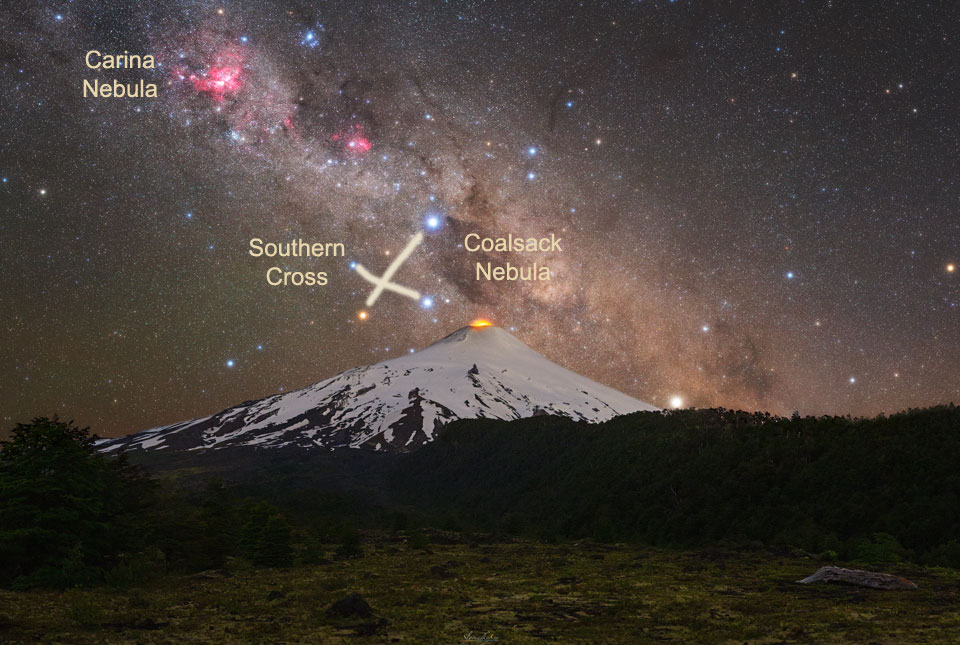25. January 2021
智利火山頭頂 ê 南十字

探索宇宙1!逐工會揀一幅無仝款 ê 影像抑是相片,𤆬你熟似咱這个迷人 ê 宇宙,閣有專業天文學者2為你3解說4。
- 原始文章:Southern Cross over Chilean Volcano
- 影像來源佮版權:Tomáš Slovinský
- 台文翻譯:An-Li Tsai (NCU)
[漢羅] 智利火山頭頂 ê 南十字
你敢有看過南十字?伊是地球南半球 siāng 有名 ê 四粒星。這張相片 sī 這個月初 tī 智利 翕 ê。南十字 拄仔好 tī 爆發 ê Villarrica 火山 ê 倒爿翕著。伊 sī tī 咱太陽系內底,活動力上強 ê 火山 之一。Kā 南十字內底上紅 ê 十字架一 tùi 上光 ê 十字架二 連去,差不多 to̍h 會指向天頂上南 ê 所在,南天極(SCP)。Tī 這个所在,所有 ê 恆星看起來 to̍h kah 地球自轉同齊 leh 踅。Tī 現代,南天極附近無較光 ê 恆星,kah 北天極(NCP)無仝,伊附近有足光 ê 北極星。若是 kā 十字架一 kah 十字架二 ê 連線延長(差不多是 in ê 角距離 ê 4 到 7 倍),to̍h 會揣著 小麥哲倫星雲。伊是 tī 咱 ê 銀河系內底,一个足光 ê 衛星星系。南十字 星群 sī 南十字星座 ê 代表,in sī 一陣真明顯 ê 星,內底有四粒 iōng 目睭 to̍h 看會著 ê 造父變星。Tī 這張相片 ê 火山頭頂,看起來敢若 leh 衝烏煙 ê sī 烏炭橐仔星雲。倒爿頂懸彼區大 koh 紅 ê,sī 當咧形成新恆星 ê 龍骨座 星雲。
[POJ] Tì-lī hóe-soaⁿ thâu-téng ê Lâm-si̍p-jī
Lí kám-ū khòaⁿ-kòe Lâm-si̍p-jī? I sī tē-kiû Lâm-puànn-kiû siāng ū-miâ ê sì lia̍p chhiⁿ. Chit-tiuⁿ siòng-phìⁿ sī chit-kò-goe̍h-chhe tī Tì-lī hip--ê. Lâm-si̍p-jī tú-á-hó tī po̍k-hoat ê Villarrica hóe-soaⁿ ê tò-pêng hip--ê. I sī tī lán Thài-iông-hē lāi-té, oa̍h-tōng-le̍k siāng kiông ê hóe-soaⁿ chi-it. Kā Lâm-si̍p-jī lāi-té siāng âng ê Si̍p-jī-kè it tùi siāng-kng ê Si̍p-jī-kè-jī liân--khì, chha-put-to to̍h ē chí-hiòng thiⁿ-téng siāng lâm ê só͘-chāi, Lâm-thian-ke̍k (SCP). Tī chit-ê só͘-chāi, só͘-ū ê hêng-chhiⁿ khòaⁿ--khí-lâi to̍h kah tē-kiû chū-choán tâng-chê leh se̍h. Tī hiān-tāi, Lâm-thian-ke̍k hù-kūn bô khah-kng ê hêng-chhiⁿ, kah Pak-thian-ke̍k (NCP) bô-kâng, i hù-kūn ū chiok-kng ê Pak-ke̍k-chhiⁿ. Nā-sī kā Si̍p-jī-kè it kah Si̍p-jī-kè jī ê liân-sòaⁿ iân-tn̂g (chha-put-to sī in ê kak-kū-lî ê sì kàu chhit pōe), to̍h ē chhōe-tio̍h Siò Be̍h-thiat-lûn seng-hûn. I sī tī lán-ê Gîn-hô-hē lāi-té, chi̍t-ê chiok-kng ê ūi-chhiⁿ seng-hē. Lâm-si̍p-jī seng-kûn sī Lâm-si̍p-jī seng-chō ê tāi-piáu, in sī chi̍t-tiuⁿ chin bêng-hián ê chhiⁿ, lāi-té ū sì-lia̍p iōng ba̍k-chiu to̍h khòaⁿ-ē-tio̍h ê Chō-hū-piàn-seng. Tī chit-tiuⁿ siòng-phìⁿ ê hóe-soaⁿ thâu-téng, khòaⁿ--khí-lâi ká-ná leh chhèng o͘-ian ê sī O͘-thòaⁿ-lok-á seng-hûn. Tò-pêng téng-koân hit-khu tòa koh âng ê, sī tn̂g-leh hêng-sêng sin-hêng-chhiⁿ ê Chûn-té-chō seng-hûn.
[KIP] Tì-lī hué-suann thâu-tíng ê Lâm-si̍p-jī
Lí kám-ū khuànn-kuè Lâm-si̍p-jī? I sī tē-kiû Lâm-puànn-kiû siāng ū-miâ ê sì lia̍p tshinn. Tsit-tiunn siòng-phìnn sī tsit-kò-gue̍h-tshe tī Tì-lī hip--ê. Lâm-si̍p-jī tú-á-hó tī po̍k-huat ê Villarrica hué-suann ê tò-pîng hip--ê. I sī tī lán Thài-iông-hē lāi-té, ua̍h-tōng-li̍k siāng kiông ê hué-suann tsi-it. Kā Lâm-si̍p-jī lāi-té siāng âng ê Si̍p-jī-kè it tuì siāng-kng ê Si̍p-jī-kè-jī liân--khì, tsha-put-to to̍h ē tsí-hiòng thinn-tíng siāng lâm ê sóo-tsāi, Lâm-thian-ki̍k (SCP). Tī tsit-ê sóo-tsāi, sóo-ū ê hîng-tshinn khuànn--khí-lâi to̍h kah tē-kîu tsū-tsuán tâng-tsê leh se̍h. Tī hiān-tāi, Lâm-thian-ki̍k hù-kūn bô khah-kng ê hîng-tshinn, kah Pak-thian-ki̍k (NCP) bô-kâng, i hù-kūn ū tsiok-kng ê Pak-ki̍k-tshinn. Nā-sī kā Si̍p-jī-kè it kah Si̍p-jī-kè jī ê liân-suànn iân-tn̂g (tsha-put-to sī in ê kak-kū-lî ê sì kàu tshit puē), to̍h ē tshuē-tio̍h Siò Be̍h-thiat-lûn sing-hûn. I sī tī lán-ê Gîn-hô-hē lāi-té, tsi̍t-ê tsiok-kng ê uī-tshinn sing-hē. Lâm-si̍p-jī sing-kûn sī Lâm-si̍p-jī sing-tsō ê tāi-piáu, in sī tsi̍t-tiunn tsin bîng-hián ê tshinn, lāi-té ū sì-lia̍p iōng ba̍k-tsiu to̍h khuànn-ē-tio̍h ê Tsō-hū-piàn-sing. Tī tsit-tiunn siòng-phìnn ê hué-suann thâu-tíng, khuànn-khí-lâi ká-ná leh tshìng oo-ian ê sī Oo-thuànn-lok-á sing-hûn. Tò-pîng tíng-kuân hit-khu tuà koh âng ê, sī tn̂g-leh hîng-sîng sin-hîng-tshinn ê Tsûn-té-tsō sing-hûn.
[English] Southern Cross over Chilean Volcano
Have you ever seen the Southern Cross?This famous four-star icon is best seen from Earth's Southern Hemisphere.The featured image was taken last month in Chile and captures the Southern Cross just to the left of erupting Villarrica , one of the most active volcanos in our Solar System . Connecting the reddest Southern Cross star Gacrux through the brightest star Acrux points near the most southern location in the sky: the South Celestial Pole (SCP), around which all southern stars appear to spin as the Earth turns .In modern times , no bright star resides near the SCP, unlike in the north where bright Polaris now appears near the NCP. Extending the Gacrux - Acrux line still further (from about four to about seven times their angular separation) leads near the Small Magellanic Cloud , a bright satellite galaxy of our Milky Way Galaxy . The Southern Cross asterism dominates the Crux constellation , a deeper array of stars that includes four Cepheid variable stars visible to the unaided eye.Just above the volcano in the image, and looking like a dark plume, is the Coalsack Nebula , while the large red star-forming Carina Nebula is visible on the upper left.
詞彙學習
| 漢羅 | POJ | KIP | 華語 | English |
|---|---|---|---|---|
| 南十字 | Lâm-si̍p-jī | Lâm-si̍p-jī | 南十字 | the Southern Cross |
| 南半球 | Lâm-pòaⁿ-kiû | Lâm-puànn-kiû | 南半球 | Southern Hemisphere |
| 太陽系 | Thài-iông-hē | Thài-iông-hē | 太陽系 | the Solar System |
| 十字架一 | Si̍p-jī-kè it | Si̍p-jī-kè it | 十字架一 | Gacrux |
| 十字架二 | Si̍p-jī-kè jī | Si̍p-jī-kè jī | 十字架二 | Acrux |
| 南天極 | Lâm-thian-ke̍k | Lâm-thian-ki̍k | 南天極 | the South Celestial Pole (SCP) |
| 地球自轉 | tē-kiû chū-choán | tē-kiû tsū-tsuán | 地球自轉 | Earth spin |
| 北天極 | Pak-thian-ke̍k | Pak-thian-ki̍k | 北天極 | the North Celestial Pole (NCP) |
| 北極星 | Pak-ke̍k-chhiⁿ | Pak-ki̍k-tshinn | 北極星 | Polaris |
| 角距離 | kak-kū-lî | kak-kū-lî | 角距離 | angular seperation |
| 小麥哲倫星雲 | Siò Be̍h-thiat-lûn seng-hûn | Siò Be̍h-thiat-lûn sing-hûn | 小麥哲倫星雲 | the Small Magellanic Cloud |
| 銀河系 | Gîn-hô-hē | Gîn-hô-hē | 銀河系 | Milky Way Galaxy |
| 衛星星系 | ūi-chhiⁿ seng-hē | uī-tshinn sing-hē | 衛星星系 | satellite galaxy |
| 南十字星群 | Lâm-si̍p-jī seng-kûn | Lâm-si̍p-jī sing-kûn | 南十字星群 | the Southern Cross asterism |
| 南十字星座 | Lâm-si̍p-jī-chō | Lâm-si̍p-jī-tsō | 南十字星座 | the Crux constellation |
| 造父變星 | Chō-hū-piàn-seng | Tsō-hū-piàn-sing | 造父變星 | Cepheid variable stars |
| 烏炭橐仔星雲 | O͘-thòaⁿ-lok-á-seng-hûn | Oo-thuànn-lok-á-sing-hûn | 煤袋星雲 | Coalsack Nebula |
| 龍骨座星雲 | Liông-kut-chō-seng-hûn | Liông-kut-tsō-sing-hûn | 船底座星雲 | Carina Nebula |
| 船底座星雲 | Chûn-té-chō-seng-hûn | Tsûn-té-tsō-sing-hûn | 船底座星雲 | Carina Nebula |